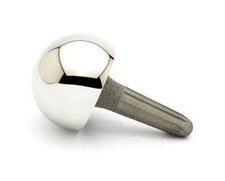
Categorised under:
Orthopaedics
>
Hip
>
Femoral stem - short
Orthopaedics
>
Hip
>
Mid head resection
From Which Medical Device
The Birmingham Mid Head Resection Prosthesis is a device which, in terms of the bone resected, lies between the Birmingham Hip Resurfacing and a more standard total hip replacement. It can be used when it is possible to preserve part, but not all, of the femoral head. This may be helpful if there is more bone loss in the femoral head than is appropriate for a hip resurfacing (particularly after avascular necrosis) or significant deformity. It is recognised that some patients with avascular necrosis who undergo hip resurfacing go on to further collapse of the femoral head and failure. The device has the potential to physiologically load the proximal femur, particularly as retention of the base of the femoral head allows a conical stem to load the proximal femur (resection through the femoral neck results in a flared proximal femur which may be less suited to loading in this manner).
The stem originally had both a straight titanium alloy version with anti-rotation splines and a curved cobalt chrome version. The latter was technically more demanding to insert and has not been adopted (Daniel et al). The stem is uncemented and conical in profile. It has a hydroxyapatite coating proximally and is impacted into a conically reamed femoral head remnant and neck. The stem is thicker than the Birmingham Hip Resurfacing and has a 12/14 taper onto which the definitive head is placed. The socket is the same as the Birmingham Hip Resurfacing, and therefore the final large diameter metal-on-metal cobalt chrome bearing is the same as the Birmingham Hip Resurfacing.
There are only a small number (184) of implantations in the 7th National Joint Registry report. Other published results from the originator include a 98.7%, 3.5 year survival for the femoral component, although this study included intermediate iterations of the stem design (McMinn et al). Other publications include a small series of ten patients with short term results (Sandford et al), and a cadaveric study suggesting the device is more resistant to failure after femoral neck notching than a standard hip resurfacing component (Olsen et al).
For further information on short femoral stems, read our article on What's Available in Short Stem Hip replacements.
References
Daniel J, Pradhan C, Ziaee H, McMinn DJ. A clinicoradiologic study of the Birmingham Mid-Head Resection device. Orthopedics. 2008 Dec;31(12 Suppl 2).
No authors listed. National Joint Registry for England and Wales: 7th Annual Report 2010.
McMinn DJ, Pradhan C, Ziaee H, Daniel J. Is Mid-head Resection a Durable Conservative Option in the Presence of Poor Femoral Bone Quality and Distorted Anatomy? Clin Orthop Relat Res. 2010 Dec 16. [Epub ahead of print]
Sandiford NA, Muirhead-Allwood S, Skinner J, Kabir C. Early Results of the Birmingham Mid-head Resection Arthroplasty. Surg Technol Int. 2009;18:195-200.
Olsen M, Lewis PM, Waddell JP, Schemitsch EH. A biomechanical investigation of implant alignment and femoral neck notching with the Birmingham Mid-Head Resection. J Arthroplasty. 2010 Sep;25(6 Suppl):112-7. Epub 2010 Jul 15.
Your opinion matters to others - rate this device or add a comment

Did you know you can Register for FREE with this website?
Registration gives you full access to all of the features of WhichMedicalDevice. Find out more ...
WhichMedicalDevice is a FREE resource created by clinicians for clinicians.
Registration is free and gives you unlimited access to all of the content and features of this website.
Find out more...Registration is free and gives you unlimited access to all of the content and features of Which Medical Device. Find out more...
Which Medical Device is a community of clinicians sharing knowledge and experience of the devices and procedures we use on a daily basis. We ask that our members register with us so that we can maintain the unbiased and independent nature of our content. Registration is quick and free.
We do not make your details available to any third parties nor do we send unsolicited emails to our members. You can read our Privacy Policy here.